Survey: Most Feds Say the Coronavirus Pandemic Has Had a 'Major' or 'Extreme' Impact on Agency Operations
Only 4-in-10 of those still reporting to work say their agencies have provided adequate protections.
A majority of federal employees say the novel coronavirus outbreak has had a “major” or “extreme” impact on their agencies’ operations, according to a new survey, though they generally give positive marks to the actions their offices have taken to prevent its spread.
About 3-in-10 federal workers are still required to report to their normal work stations, according to the survey conducted by the Government Business Council, the research arm of Government Executive. Many of those are on the frontlines of the fight against COVID-19, such as Homeland Security Department officers, Veterans Affairs Department health care providers and Army Corps of Engineers employees. Only about 40% of federal workers still reporting to their normal work stations, however, said their agencies have provided them with the materials and equipment they need to stay safe, while 37% said they have not.

Overall, nearly 70% of federal employees said they approve of their agencies' efforts to prevent the spread of the coronavirus. The same rate of employees said ensuring the safety of the workforce was their agencies’ top priority. Nearly 6-in-10 respondents said the pandemic has had a “major” or “extreme” impact on operations, while just 2% said it has had no impact at all.

One-in-three federal workers said it is not at all important to physically be in the office to do their jobs, while just 25% said it is very or extremely important. The respondents overwhelmingly said their supervisors have supported them working remotely, with just 9% saying their agencies have been “not at all supportive” of the transition to work from home.
One employee at U.S. Citizenship and Immigration Services highlighted the “major impact” the pandemic has had on operations, noting, “We had to cancel thousands of interviews for permanent residency and naturalization, and many ceremonies to make people U.S. citizens.”
“Catching up will take months,” the employee said.
Another federal worker said top leadership was supportive of teleworking, but that message was muddied as it worked its way down the ranks. “It was the management in between that disagreed and required the workforce to come in during the pandemic,” the employee said.
Several respondents said they are on partial telework, with their agencies requiring employees to go into the office for part of each week. Others are worried about eventually returning to their work stations. “I'm concerned that if or when employees are told to report back in the office, will there be personal protection equipment provided?” one worker said.
The survey was sent to a random sample of Government Executive Media Group subscribers from April 8 through April 17. It received responses from 728 federal employees and has a margin of error of plus or minus 4%. You can see the full results here.




